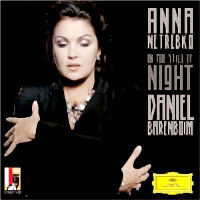The setting is Salzburg, September of 2009. Anna Netrebko and Daniel Barenboim partnered for a recital with lofty aspirations and difficult works mere months after her unfortunate Lucia at the Met. Thanks to the foresight to record this evening, we now have a record of a great night – hopefully a turning point – in the appreciation of Russian song.
In years past, many people viewed the wonderful works of Tchaikovsky, Rimsky-Korsakov, and the rest of the Russian masters as inaccessible to the western world. The complicated language, demanding emotional intensity of the legendary Russian poets, and often vocally demanding writing can make for a deterrence to the singer considering such repertory. These works require an immensely talented singer, one with great range vocally and emotionally. If anyone had doubts that Anna Netrebko was any longer an artist of this caliber, In the Still of Night will lay those to rest.
In the interest of brevity I will not detail every nuance, every color and every perfectly crafted phrase that Ms. Netrebko uses to great effect in her recital, as the list would be almost endless. The only downside I can find in this performance is the occasional strain in her absolute top register, above A is my guess as almost all of these works I’ve never heard before.
But for all the beauty Ms. Netrebko brings to these songs, her voice is best in the story of a spurned lover begging for forgetfulness in the Tchaikovsky song “Zabit’ tak skoro.” Her voice is so well suited to heartbreak, and the hint of breathlessness that she brings to the opening makes the anger in the climax of the piece seem all the more desperate.
Every opera lover has their own analogy to Ms. Netrebko’s voice; I like to call it “dark-chocolate-covered honey drops wrapped in golden foil.” In this hour-long recital, Ms. Netrebko uses every color available in her shockingly large palette to its perfect ability. Every sound is drawn beautifully from the masterwork poetry, heartfelt and touching. I truly feel that the emotional commitment to these songs is unmatched in her previous work. If this is an indication of things to come I will be devoting many more hours to listening to her.
Daniel Barenboim has a feel for this repertory like few others in this world. His interpretations are playful, doleful, virtuosic, folksy, and all around wonderful. He plays every song as if he has orchestrated it in his mind, and you hear the colors of every instrument in his accompaniment. He supports Ms. Netrebko wonderfully, and together they exemplify the relationship between singer and pianist. One need only listen to “Sred’ mracnikh dney” to hear how expressive several bars of music can be, and how amazingly it can set the tone for the song.
After listening to this album I wondered, where’s the rest? Who among today’s great artists will have the courage to take on a Fischer-Dieskau like project of recording the great Russian songs? For a while I hoped Dmitri Hvorostovsky would be that man, but since his decision to move directly to Eurotrash I doubt his urge to record that kind of Magnum Opus.
I hope dearly that Ms. Netrebko takes the time to cement her legacy in recording the great works of her compatriots. Her voice and skills are uniquely suited to this repertoire, and it would be not only a service to her audience but her country to undertake such a project.



